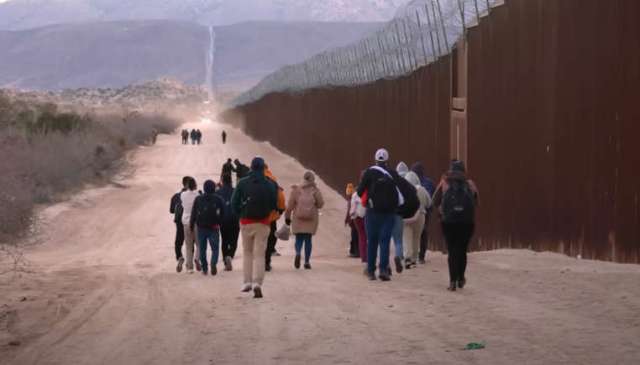A proposed Arizona bill would dramatically expand the state’s Castle Doctrine law to allow the use of deadly force against anyone trespassing on private property.
Current law allows only for self-defense in one’s home.
This from msn.com.

The bill was introduced by a Republican lawmaker aiming to protect ranchers and farmers from illegal aliens on their land.
Legal protection would be given to a rancher currently facing murder charges for fatally shooting an unarmed Mexican migrant in the back as he crossed the rancher’s property.
Rep. Justin Heap said:
If a farmer owns 10,000 acres of farmland, his home may be a half a mile away from where he is, and if he sees someone on his land, can he approach them and trespass them from his property?
Rep. Heap explained:
So, this is an amendment to essentially fix that loophole because we have several cases and, unfortunately, an increasing number of cases, as we are seeing an increasingly larger number of migrants or human traffickers moving across farm and ranchland.
Supporters argue it protects property owners’ rights, but critics say it licenses killing illegals.
Rep. Alexander Kolodin said:
This is a great Second Amendment bill that is also protecting the rights of the accused.
The bill passed along party lines in the Republican-controlled House but is expected to be vetoed by the communist/globalist governor. However, the groundwork will have been accomplished for when Katie Hobbs is ousted.
The recent proposal by Arizona Republicans to introduce a trio of bills targeting illegal immigration [alien invasion] has reignited heated debates and raised significant concerns about the implications of such legislation.
The bills, which aim to criminalize border crossing and address the surge of migrants [aliens] at the state’s southern border, have sparked intense political discourse and public scrutiny, drawing attention to the complex intersection of immigration policy, constitutional considerations, and the welfare of immigrant [alien invader] communities.
Arizona Republicans have put forth a set of proposals that would make it a state crime for migrants (alien invaders) to cross the border, despite questions about the constitutionality of such measures and the potential overlap with federal immigration enforcement authority. The proponents of the bills have framed the initiative as a “necessary response to the federal government’s perceived leniency towards illegal immigration” (alien invasion), emphasizing the need for state intervention in addressing border security and immigration enforcement.
The proposed legislation has elicited diverse and often polarized reactions, with proponents emphasizing the importance of bolstering border security and addressing the influx of migrants (alien invaders), while critics express apprehensions about the potential repercussions of criminalizing border crossing and the constitutionality of such measures.
The bills have prompted discussions on the balance of state and federal authority in immigration enforcement, constitutional implications, and the ethical considerations surrounding the criminalization of individuals seeking refuge and opportunities in the United States.
The bills’ potential impact on immigrant communities, particularly in Arizona, has emerged as a central point of concern. Critiques have highlighted the potential for increased fear and insecurity among immigrant populations, as well as the broader social and economic ramifications of criminalizing border crossing.
The proposals have underscored the importance of addressing immigration challenges through comprehensive and humane approaches, taking into account the historical and generational impact of immigration policies on individuals and communities.
As the proposed bills navigate the legislative process, they have become emblematic of the broader political landscape, with discussions centering on the motivations behind the initiatives, their potential outcomes, and the implications for Arizona’s stance on immigration policy.
The contentious nature of the legislation has prompted reflections on the role of state-level policies in shaping immigration discourse and the complexities of addressing border security and immigration enforcement in a diverse and dynamic political environment.
The Arizona bill targeting alien invasion has ignited intense debates, reflecting the complex interplay of political, legal, and humanitarian considerations. As discussions continue, the proposed legislation “will demand robust discourse and community engagement, underscoring the need for diverse perspectives and concerns” throughout the process of inclusive dialogue and informed decision-making.




